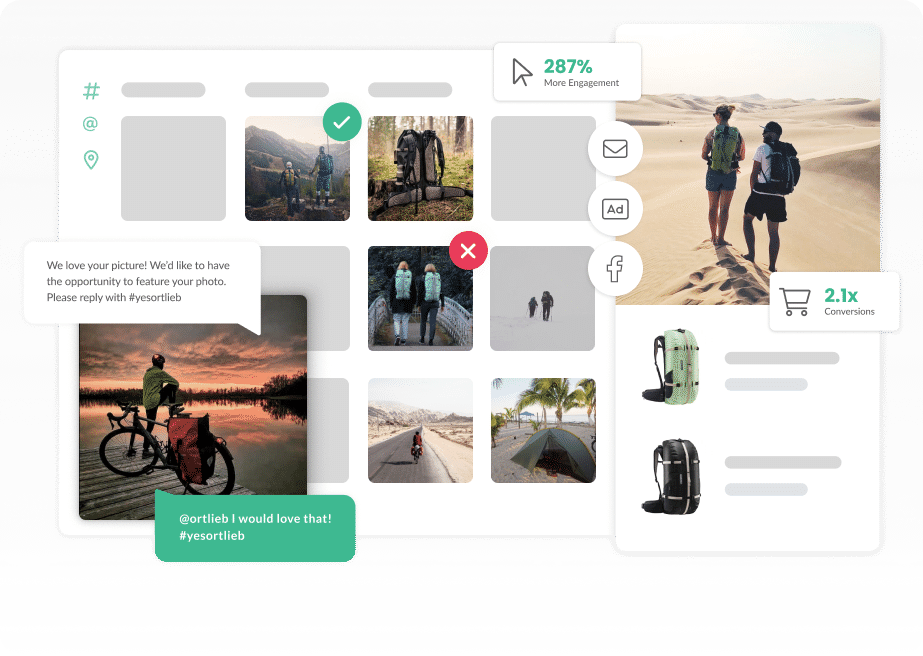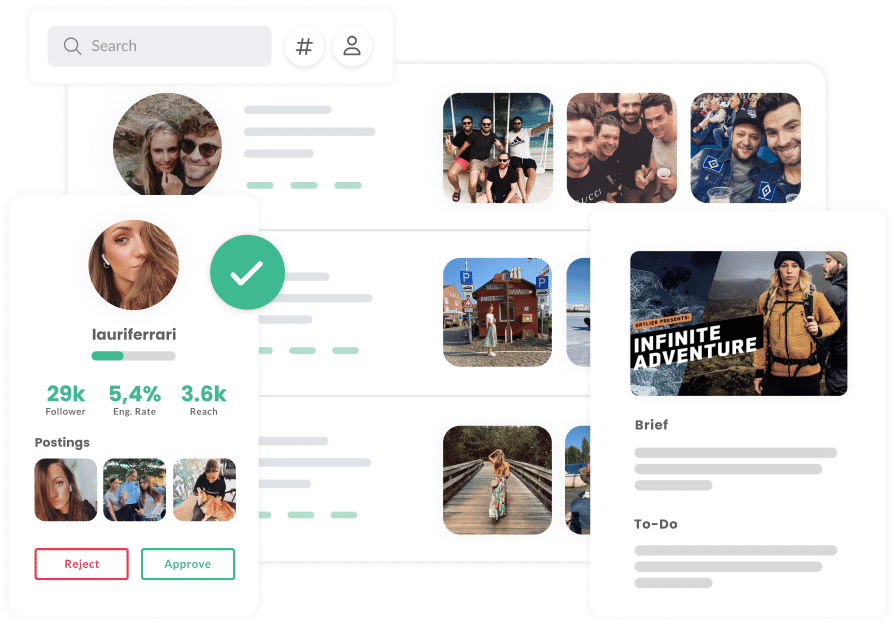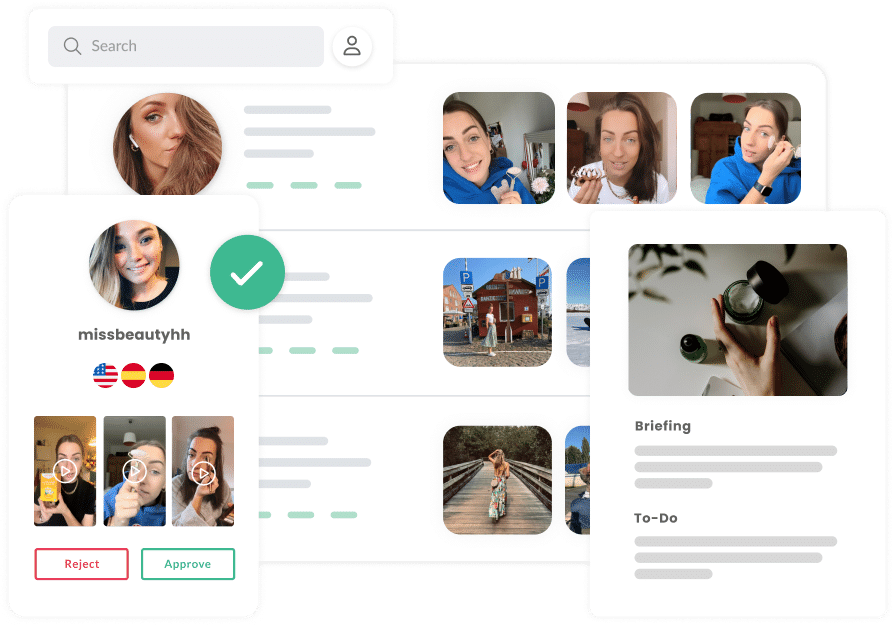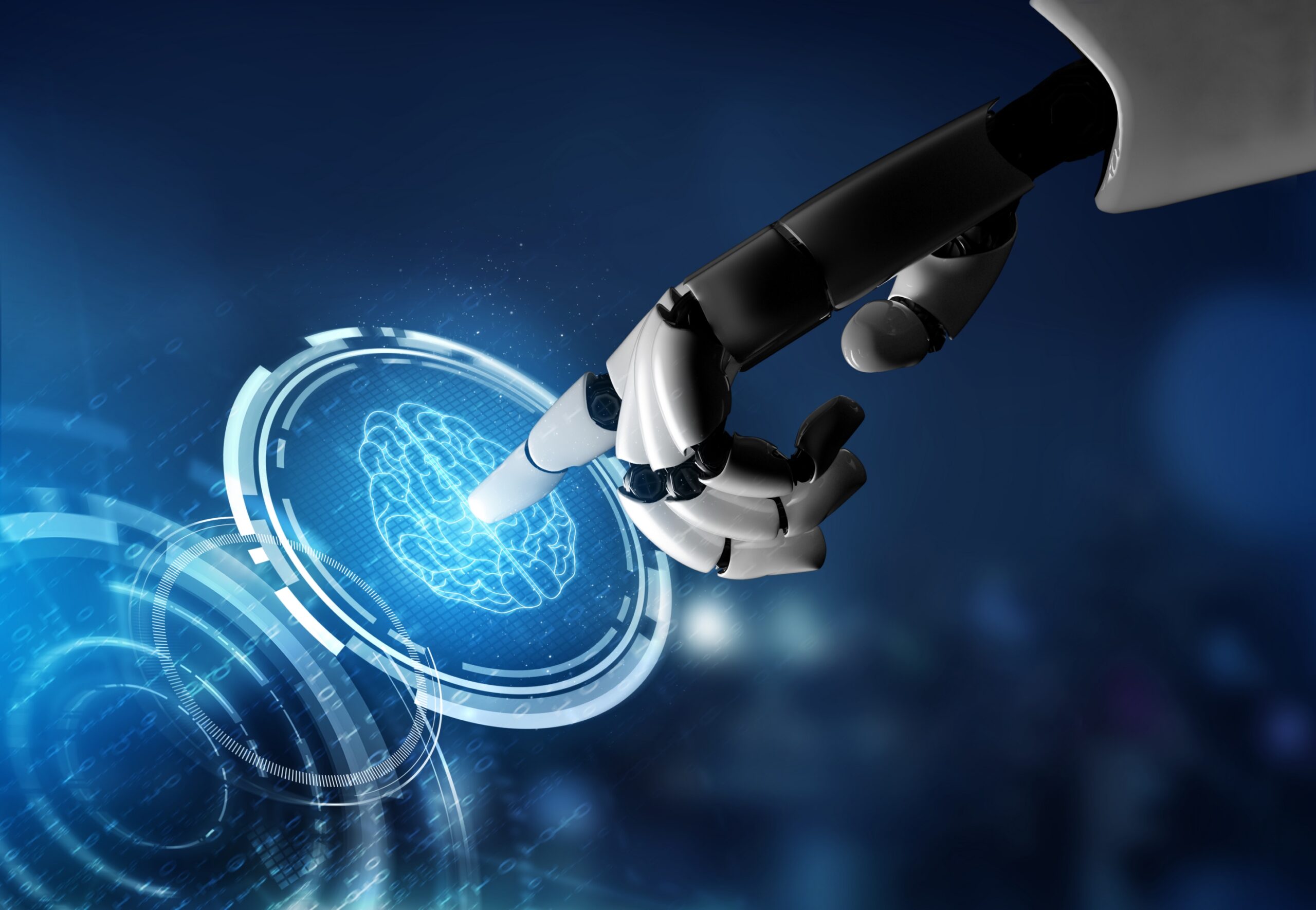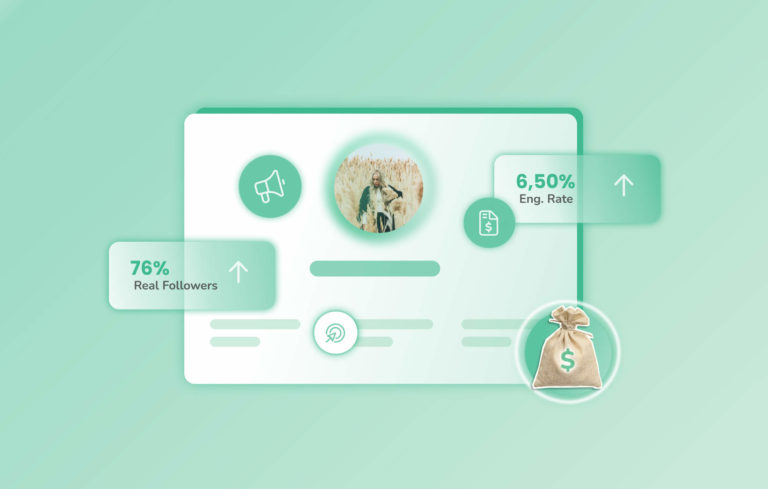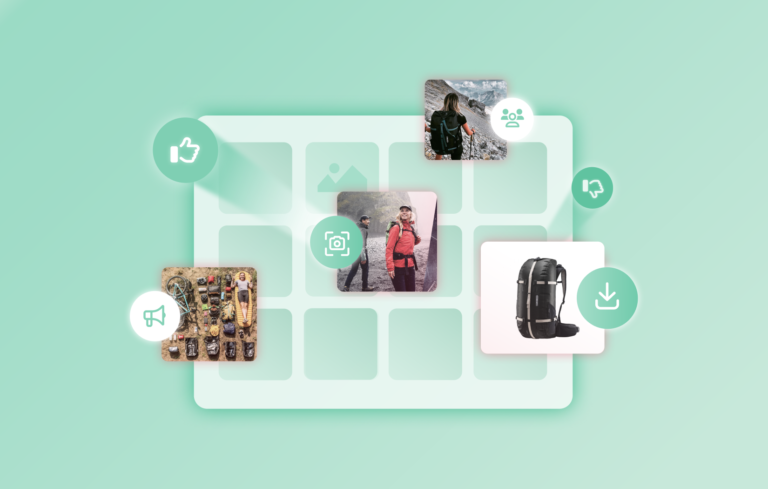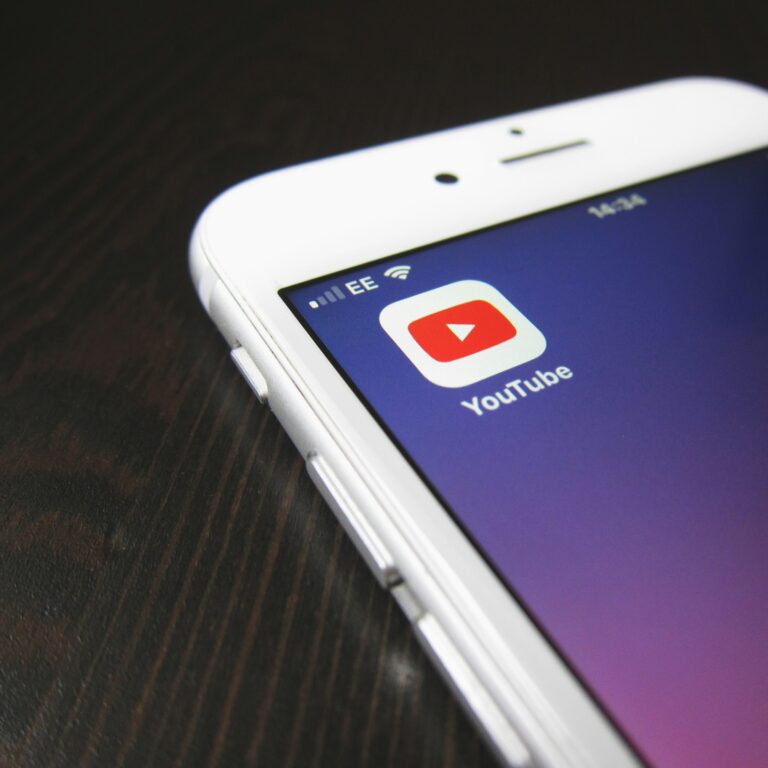Artificial intelligence (AI) is a rapidly evolving technology that is changing the way we do many things, including marketing. In particular, AI is having a significant impact on influencer marketing. New tools and services are making it easier to identify the right influencers to work with, analyze audience data to improve targeting and automate certain tasks. With virtual influencers, AI is even bringing a whole new niche to the table.
In this blog post, we will explore the ways in which AI is affecting influencer marketing and what this means for brands and influencers alike. We will also discuss the challenges and limitations of using AI in influencer marketing, as well as the future of this exciting and rapidly evolving field.
What is Artificial Intelligence?
The Role of AI in Influencer Marketing
AI, or artificial intelligence, refers to the use of computer algorithms to perform tasks that typically require human intelligence, such as learning, problem-solving, and decision-making. In influencer marketing, AI plays a crucial role in two main areas. One of them is evaluating data and the other one is creating content in the form of virtual influencers.
According to various recent studies, finding the right influencers to work with is the biggest and most consistent challenge for influencer marketing managers. Research requires a lot of time and even if you end up finding influencers where the public numbers look right, there is still always a risk of fraud, like fake followers, or the personality might just be a mismatch.
In the following, we’ll take a closer look at how AI can support you in finding the right influencers and making smarter decisions.
Conducting a deep search
AI tools can conduct a deep search to identify the influencer’s brand affinities and check their other activities to mitigate any risks. This helps you to identify the right influencers to work with and avoid working with influencers who may not be a good fit for your brand.
Analyzing audience data
With the help of AI, you can analyze audience data to identify the influencers who have the most engaged and relevant audiences. This helps marketers to identify the right influencers and ensure that their campaigns are reaching the right people.
Predicting success
AI can help predict the success of an influencer by analyzing their past performance, audience engagement, and other factors. This helps you to ensure that your campaigns are successful.
Combating influencer fraud
AI can detect fake accounts and combat influencer fraud. This helps you to avoid working with influencers who may be engaging in fraudulent behavior.
Overall, marketers can save time and resources by using AI tools, while also improving the effectiveness of their influencer marketing campaigns.
How are virtual influencers changing the influencer marketing industry?
While virtual influencers are not created solely by AI, it plays a significant role in their creation and operation. The creation process involves 3D artists using CGI (computer-generated imagery), motion-capture technology, and AI tools to design and animate the virtual influencer. AI is also used to power virtual influencers as chatbots.
A recent HypeAuditor study found that virtual influencers have almost three times more engagement than real influencers. However we should keep in mind here that the high engagement is likely related to virtual influencers being a new and exciting phenomenon that draws people’s attention.
Another survey by The Influencer Marketing Factory found that 27% of users follow virtual influencers for their content, 19% for the storytelling, and 15% because they inspire them.
Overall, virtual influencers seem to be a promising option for brands looking to engage with their audience on social media. They offer a unique approach to influencer marketing and have the potential to reach a wider audience than real influencers. Let’s take a peak at what it looks like when virtual influencers are in action.
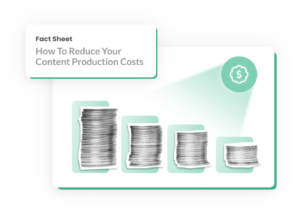
Download our fact sheet now and learn how to optimize content production for your brand and reduce costs in no time.
5 Examples of Brands working with virtual Influencers
Virtual influencers are becoming increasingly popular in the world of marketing, and many companies are already using them to promote their products and services. Here are some real-world examples of companies working with virtual influencers for marketing campaigns:
Balmain
In Fall 2018, French luxury fashion house Balmain launched a campaign starring a »virtual army« of three virtual influencers, who modeled for the brand. The overall goal of the campaign was to showcase Balmain’s edgy style and focus on bringing the fashion house to the forefront of the digital age.
The three virtual influencers were designed by photographer Cameron-James Wilson, who famously created virtual influencer Shudu in 2017. The clothing was »styled« by CLO Virtual Fashion, which creates hyperrealistic 3D garment simulations.
The final results were then showcased on Balmain’s social media accounts and website.
Overall the campaign received mixed reactions, with some applauding Balmain’s creativity and others criticizing the lack of diversity among the virtual models.
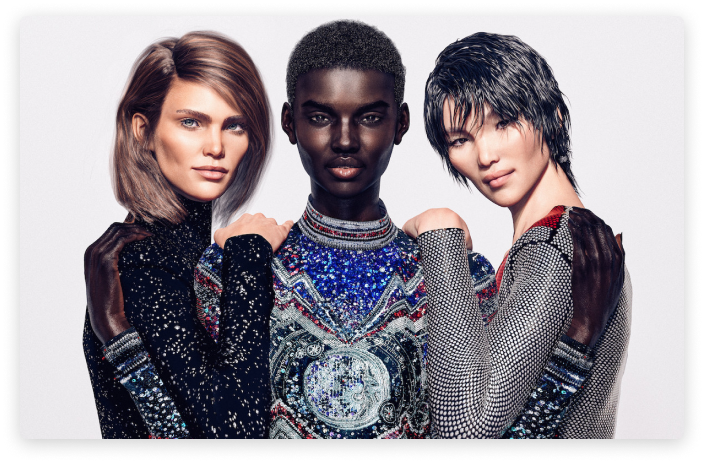
Source: Balmain
Renault
Renault created their own virtual influencer in February 2019 named Liv Renault. Liv was introduced as the virtual brand ambassador of Renault’s Kadjar SUV.
She was created by Renault’s marketing team and was designed to have a personality that aligns with Renault’s brand values. For her first campaign, Liv was featured in a TV commercial promoting the Renault Kadjar.
In preparation of the campaign, Renault further used an AI social listening tool to identify trusted influencers within their target group and segment audiences to gain insights on the qualities that would be relevant for Liv.
The campaign was part of Renault’s shift towards one-to-one communication on social media and away from mass reach.
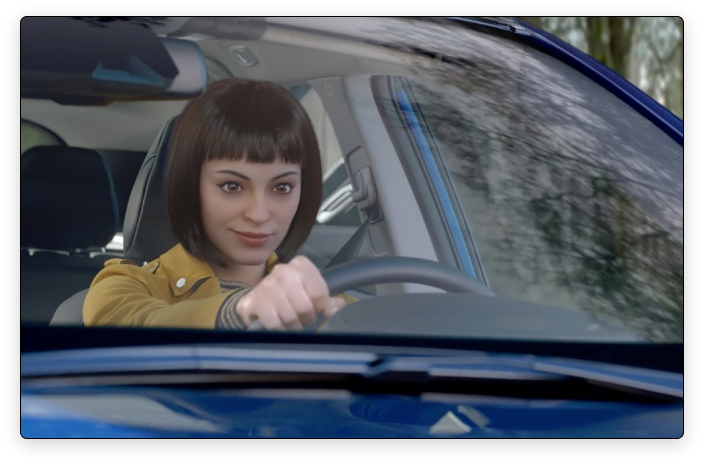
Source: Renault
KFC
KFC recently launched a social media campaign featuring a computer-generated version of the fast-food chain’s founder, Colonel Sanders, as a virtual influencer. The campaign was created in partnership with Wieden & Kennedy.
The CGI Colonel was introduced on the @KFC account on Instagram with a series of posts showing his “secret recipe for success” tattoo.
The suave Virtual Influencer Colonel showcased his fabulous lifestyle on the platform with posts tagged #secretrecipeforsuccess. He also promoted brands like Dr. Pepper, TurboTax, and Old Spice on Instagram until April 2022. Besides that, the CGI Colonel was also a part of KFC’s promotion of their new plant-based chicken.
Overall the campaign can be seen as a humorous take on the marketing trend of social influencers. KFC’s community rewarded it with amused comments and mostly positive feedback.
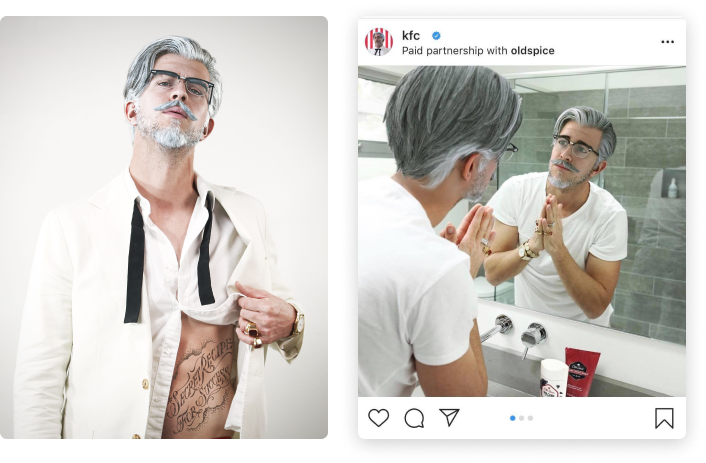
Source: KFC
Samsung
Samsung worked with virtual influencer Lil Miquela to promote their new Galaxy S21 smartphone. The campaign was part of Samsung’s Team Galaxy campaign, which featured four hero influencers, including Lil Miquela, Steve Aoki, Millie Bobby Brown, and Ninja.
The campaign aimed to engage with Gen Z and Millennials and featured a 60-second film showcasing the collective four Team Galaxy heroes to illustrate a step-change in Samsung’s user image and inspire the audience. It also included 30-second individual films for each Team Galaxy hero, bespoke to who they are and their audience.
Lil Miquela, who is a digital avatar, has over 1.6 million followers on Instagram. She was featured in Samsung’s Team Galaxy campaign and was quoted saying, “Samsung allows me to stay connected every day with my Galaxy S10”
The campaign generated 126M organic views and 24M engagements, activated advocates across social media, and increased Samsung’s earned mentions by 12% on Instagram.
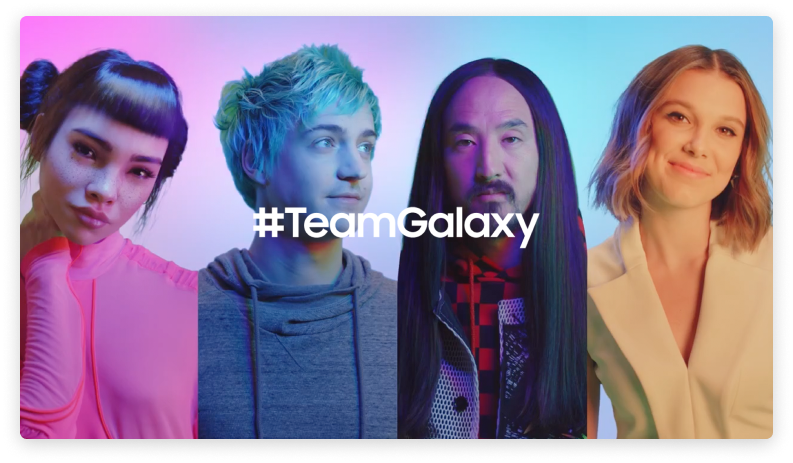
Source: Samsung
Vogue
Vogue worked with virtual influencer Noonoouri to promote their September 2023 issue.
Noonoouri is a digital avatar created by Joerg Zuber, the founder of creative agency Opium Effect. She is a 19-year-old fashionista who has worked with most of the top brands in the fashion industry, including Dior, Balenciaga, Valentino, and Versace.
Noonoouri has over 400,000 followers on Instagram and has been featured in fashion campaigns for various brands. She advocates for sustainable fashion and is a vegan who refuses to wear furs.
Vogue featured Noonoouri on their Instagram account to promote their September issue. The virtual influencer was seen wearing a dress from the issue shooting and was tagged with the hashtag #VogueSeptemberIssue.
The post was liked by many of Vogue’s followers and generated a lot of buzz on social media. Noonoouri’s unique look and style have made her a popular influencer, and her partnership with Vogue helped promote the magazine.
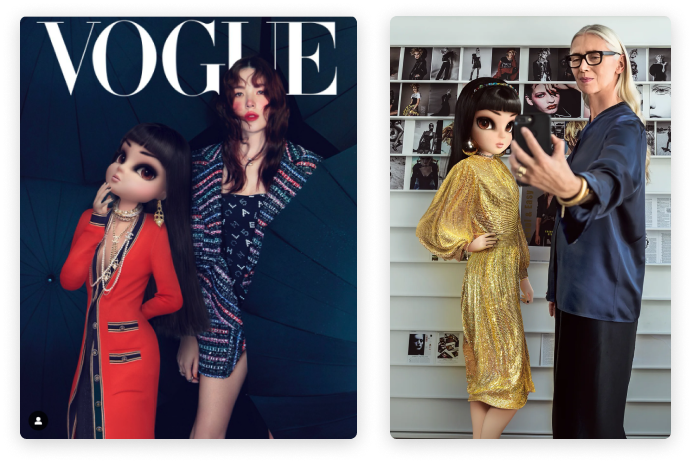
Source: Vogue
These examples demonstrate how virtual influencers are becoming a valuable tool for marketers to promote their products and services. Virtual influencers offer more control and engagement than human influencers, and they can offer nearly three times the engagement rates of real influencers. As the technology behind virtual influencers continues to evolve, we can expect to see more companies using them in their marketing campaigns.
Challenges and limitations of AI in influencer marketing
Now despite the fact that AI is an exciting novelty that’s shaking up the influencer marketing world, it is quite obviously not a perfect solution and comes with certain challenges and limitations. Let’s dive deeper in the most pressing ones.
Copyright and IP issues
AI-generated works may infringe on copyright, patent, or trademark laws, and it may be unclear who owns the content created by generative AI platforms. Before businesses can use generative AI, they need to understand the legal risks and how to protect themselves.
AI developers should ensure that they are in compliance with the law regarding the acquisition of data used to train their models. Including licensing and compensating individuals who own the IP that developers seek to add to their training data.
Brands must be wary of copyright issues when using AI that has been trained on copyrighted content
Lack of creativity
AI models are trained on large datasets, which can lead to the generation of content that is similar to existing content. This can result in a lack of originality and creativity in the content generated by AI.
Additionally, AI models may not be able to understand the nuances of human communication, such as sarcasm or humor, which can result in content that is tone-deaf or inappropriate
To overcome this challenge, businesses can use AI to generate content ideas and then have humans refine and personalize the content. By combining the strengths of AI and human creativity, businesses can create more effective influencer marketing campaigns
Brand safety
One limitation of AI within the influencer marketing space is brand safety. With easy and open access to AI, there is a risk of brand messaging being misinterpreted or taken out of context.
While virtual influencers are presumably less likely to create or become involved in controversies than human influencers, they are not completely immune.
Further, virtual influencers may be perceived as less authentic than human influencers. This can impact their effectiveness in influencer marketing campaigns. As a consequence brands may need to work harder to ensure that their virtual influencers are perceived as genuine and trustworthy
Most importantly, brands need to ensure that their virtual influencers comply with their brand values. Virtual influencers can be customized to comply with brand values, but brands need to ensure that only what is in line with their values is published.
Accuracy of audience insights
AI algorithms rely on data to make predictions and recommendations. If there is not enough data available, the accuracy of the insights generated by the AI may be compromised. Which can lead to ineffective campaign targeting and lower ROI.
This can also happen if the data used is outdated or if it was collected using flawed methods. Further, AI algorithms can, of course, also be subject to human bias if the data used to train the algorithm is biased
High Costs
While virtual influencers can provide a cost-effective alternative to human influencers, there are still costs associated with creating and maintaining them. This means that brands may need to invest in technology and resources to create and manage virtual influencers. However, this might not make it more cost effective than »traditional« influencer marketing after all.
The same goes for the use of AI-tools for influencer marketing purposes, or even developing custom AI-solutions for influencer marketing. Both of these options, depending on the scope of use, can come with very high costs.
How can you avoid common issues and challenges of using AI in influencer marketing?
There are many answers to this question, but the most obvious one is to combine AI with human creativity.
While AI-generated content can be effective, it may lack the authenticity and emotional depth of human-generated content. By combining AI with human creativity, you can create content that is both personalized and authentic.
The same goes for the final choice of the perfect influencers. AI can help discover and validate appropriate influencers, but human oversight is still crucial in influencer marketing campaigns. Marketers like you and me can provide the intuition and creativity needed to ensure that the content is effective and resonates with the target audience.
A good middle ground between going all in on AI-Support and doing every manually can be the use of an influencer marketing tool like squarelovin.
With such a tool, you can build your individual ambassador pool and select influencers with an optimal brand fit. The platform also allows you to easily create and efficiently manage your campaigns, from briefing to payment.
Another plus point is the integration of first-party data, as the squarelovin Influencer Manager is connected to various social media platforms via direct interfaces. This gives you first-hand insights into the performance of the influencers you work with.
If you want to learn more about influencer marketing tools in general, have a look at our blogpost on the topic.
Conclusion: How will the use of AI in Influencer Marketing develop?
One of the most significant impacts of AI on influencer marketing will be the ability to deliver hyper-personalized experiences to consumers. AI-powered analytics can help predict consumer behavior, identify emerging trends, and forecast market demands. Moving with these new development will give you as a marketer a competitive edge in this rapidly evolving landscape.
AI is likely to further influence the effectiveness of influencer marketing. Artificial intelligence can optimize campaigns through data-driven decision-making. AI algorithms can analyze real-time data, identify patterns, and track campaign performance accurately. This allows you to refine your strategies, target the right audience, and maximize their reach and return on investment.
As AI continues to evolve at a rapid pace, marketers need to embrace its potential to reshape the marketing landscape. Make sure to harness the power of AI and you will gain a competitive advantage by delivering targeted, personalized experiences that drive business success.
Sources
https://afluencer.com/artificial-intelligence-influencer-marketing/

